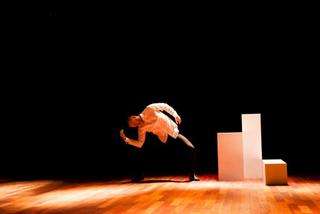|
Back
Imagine that - a choreographed Messiah Toronto
The Opera House
12/14/2013 - & December 15, 2013
George Frideric Handel: Messiah
Jacqueline Woodley (soprano), Krisztina Szabo (mezzo-soprano), Isaiah Bell (tenor), Geoffrey Sirett (bass)
AtG Orchestra and Chorus, Christopher Mokrzewski (conductor), Robert Cooper (choral consultant)
Joel Ivany (director), Jennifer Nichols (choreographer), Erika Connor (costume designer)

G. Sirett (© Darryl Block)
Handel’s Messiah is a major seasonal industry in Toronto (as it is in many cities). We have it large-scale (with the Toronto Symphony Orchestra), smaller scale (thanks to the Tafelmusik Baroque Orchestra), the Dublin Messiah, Mozart’s Messiah, a singalong Messiah, a children’s Messiah, plus others. Now the ardently creative Against the Grain Theatre Company have presented a staged Messiah.
Director Joel Ivany and choreographer Jennifer Nichols have not imposed a dramatic scenario or plot on to Handel’s allusive work, nor have they made it into some sort of pageant enacting the events alluded to. Instead, as Ivany stated in his program note, their aim was to reveal the oratorio’s beauty “through a movement-based journey of discovery”. At first it seemed quite conventional, with the four formally-dressed soloists lined up, scores in hand. But as soon as tenor Isaiah Bell began to sing his opening number, “Comfort ye”, he dropped his score, and took off his jacket, tie, and shoes. Removing shoes seemed to be the launching moment for everyone (solists and chorus members) as they joined the expressive gesture and movement. And to fulfil the staging requirements, everyone sang from memory throughout.
Choreographer Nichols has experience with the Atelier Ballet which focuses on 18th century styles. This would seem to have influenced the eclectic moves she devised for the performers - none of whom is a professional dancer. There were a couple of points when a degree of stillness would have been welcome (during “I know that my redeemer liveth”, for example), but overall the movement served the texts well. Things went very silly in “All we like sheep” - and this actually worked. Bass Geoffrey Sirett has rather a John Cleese look about him and at times his movements bordered on silly walks. He had some very athletic moves during the vocally demanding “The trumpet shall sound” (see photo above).
The 14-member chorus frequently left the stage to sing amongst the audience, requiring conductor Christopher Mokrzewski to conduct in a very large arc. Overall he kept things both buoyant and together; the 18-member orchestra impressed, especially the two trumpeters. There were a few cuts (there usually are). I regret the absence of the charming pastoral pifa that follows “For unto us a child is born” - after all, it is a siciliana and would accompany a lovely dance.
The four soloists were all well up the task vocally and gave the impression of being thoroughly in synch with the staging ideas. The lighting gave us some not-always-welcome stark moments; a longer preparation time might have worked out some kinks (also the venue might have limited resources).
Joel Ivany was inspired to create this production upon seeing the staging of Pergolesi’s Stabat Mater at this year’s Glimmerglass Festival (reviewed here). Both productions demonstrate just how effectively a sacred work can be choreographed.
Once again AtG have chosen an unusual venue. The Opera House is actually a flippantly-named rock music emporium built in 1909 as a vaudeville house. About 400 patrons were crammed in with greater or lesser degrees of discomfort. But at least there was a bar.
Against the Grain has a history of doing things once and then moving on. (Their next production, in June, will be Pelléas et Mélisande at an outdoor venue.) A staged/choreographed Messiah, though, could well become a regular part of the seasonal offerings whether offered by AtG or some other enterprising group.
Michael Johnson
|